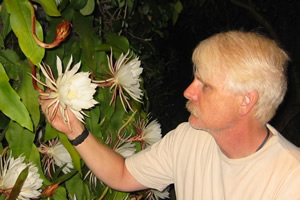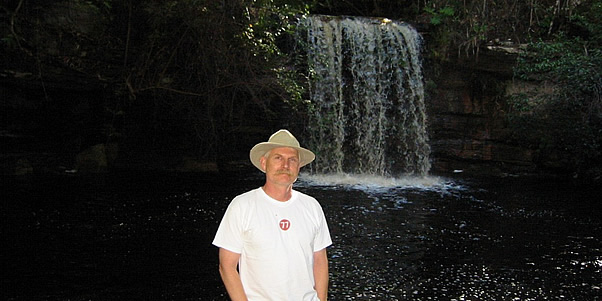Professor's Perspective
Brazilian Specialists Visit Cal State Fullerton for May 9 Conference
May 5, 2009
By Robert Voeks
For many Americans, Brazil is perceived as an awkward mix of environmental degradation and decadent excess.

Robert Voeks inspects a moon flower in the Amazon.
We are acutely aware that the Brazilian Amazon and its luxuriant biodiversity is disappearing. We are bombarded with images of beautiful, barely-clad women writhing to samba rhythms during carnival. And, we are prepared every four years to be wowed by the amazing ‘ginga’ of the Brazilian national soccer team.
But the only Portuguese-speaking country in the Americas is much more than this.
As the largest and most populous nation in South America, Brazil rivals the continental U.S. in area and abundance of natural resources. Its economy has grown dramatically in recent years and, unlike many other developing countries, it has applied a fair share of this new wealth to elevating the standard of living of its poorest workers.
Long governed by stone-faced dictators in mirrored sunglasses, Brazil can now boast several democratically-elected presidents and a comprehensive constitution. And unlike earlier leaders who took their lead (if not orders) from Washington, D.C., the current president — Luiz Inacio da Silva (Lula) — is a populist labor leader who calls world events as he sees them. In a much publicized recent interview with Britain’s Prime Minister, for example, he stated that the current global economic crisis was the direct consequence of white, blue-eyed bankers who have brought the world economy to its knees. And, he was mostly right.
On Saturday, May 9, a contingent of Brazilian specialists (university professors and graduate students) will gather at Cal State Fullerton to celebrate the land, life, literature and culture of Brazil. As part of the annual Conference of Southern California Brazilianists, researchers will present their original scholarly work.
Presentation topics will range from political change and literature critique to environmental degradation and musical traditions. Included in the day’s special events is a demonstration and discussion of Afro-Brazilian capoeira. Brought to us by the Pasadena-based Brazilian Cultural Foundation — the director is alumnus James Sera (B.A., M.A. anthropology ’91, ’93) — the event will feature a demonstration by a group of American students of ‘capoeira angola.’
This variety of capoeira, which often is described as a hybrid art form of martial art and dance, is thought to be the most traditional form of capoeira, employing more floor movement and less acrobatics. Introduced by enslaved Africans to colonial Brazil at least two centuries ago, capoeira has evolved from an outlawed African-derived combat technique to an iconic manifestation of African cultural influence in the Americas.
We are especially privileged to have the presence of one of Brazil’s most esteemed practitioners of capoeira angola. Known by his many students as ‘Master Angola,’ António Albino Soares is recognized as one of Salvador da Bahia’s (the home of capoeira) most accomplished practitioners and instructors, having given workshops in the U.S., Canada, Israel, Germany and elsewhere. The conference and capoeira demonstration is free and open to all who are interested.
Robert Voeks is a Cal State Fullerton professor of geography, president of the California Geographical Society, and editor-in-chief of the journal Economic Botany. His research interests focus on tropical ethnobotany, traditional healing systems and the African diaspora.


